人教版英语八年级上册辅导班国庆节unit1
人教版八年级上册Unit1知识点复习课件(共43张PPT)

SectionB
enjoyable adj. 有乐趣的 <2a>
Eg. Swimming is one of the most enjoyable
activities. enjoy+n./代/Ving v.喜欢/享受 enjoy oneself 玩的开心 enjoy my weekend 享受我的周末 enjoy learning English 享受(喜欢)学习英语 常接Ving作宾语的动词/动词短语:
visitor n. 游客
3. Grammar Focus 复合不定代词
1. 作主语时 谓语动词用单数
Eg.Everyone is happy. 2.被定语修饰时(形容词/动词不定式/else 等) 定语后置.
Eg.I like nothing old, but friends.
Eg.Would you like something else? 3.some类用在肯定句,any类用在否定句/ 疑问句在表示请求/提议等希望得到对方 肯定答复的问句中用some不用any
Eg. He has good taste in clothes.
look feel sound smell taste
anything
anyone
everything
something
anything anything
nothing
11. of course "当然" <3a> =sure/certainly of course not-当然不 Eg. --- Would you mind closing the window?
Eg. They were on vacation last
人教版八年级上册英语Unit 1知识点梳理及语法讲义(教师版)

八年级上册英语Unit 1知识点与语法精讲精练词汇梳理(一)完成单词梳理:名词:1. hen母鸡 2. pig 猪 3. diary 日记;记事簿4. activity 活动5. paragliding 滑翔伞运动6. bird 鸟7. bicycle 自行车8. building 建筑物;房子9. trader 商人10. difference 差别;差异11. top 顶部;表面12. umbrella 伞;雨伞13. hill 小山;山丘14. duck 鸭动词:1. seem 好像;似乎;看来 2. decide 决定;选定 3. wonder 想知道;琢磨4. wait 等待;等候代词:1. anyone 任何人 2. something 某事;某物 3. nothing 没有什么4. everyone 每人;人人;所有人5. myself 我自己;我本人6. yourself 你自己;您自己7. someone 某人副词:1. anywhere 在任何地方形容词:1. wonderful 精彩的;绝妙的 2. bored 厌倦的;烦闷的3. enjoyable 有乐趣的;令人愉快的4. wet 湿的;潮湿的5. hungry 饥饿的兼类词:1. few (adj/pron)不多;很少 2. most (adj/adv/pron)最多;大多数3. try (n/v)尝试;设法;努力4. below (prep/adv)在……下面5. enough (adj/adv)足够的(地)6. dislike (v/n)不喜爱(的事物)7. as (adv)像……一样(conj)当……时;如同(二) 词汇变形小结:1. wonder (v. 想知道) — wonderful (adj. 精彩的;绝妙的) — wonderfully (adv. 精彩地)2. bore (v. 使……厌烦) — bored (adj.厌倦的)— boring (adj.令人厌倦的)3. diary (n. 日记) — diaries (复数)4. enjoy (v. 喜爱) — enjoyable (adj. 有乐趣的;令人愉快的)5. activity (n. 活动) — activities (复数)6. decide (v. 决定) — decision (n. 决定)7. build (v. 建造) — building (n. 建筑物;房子)8.trade (n/v贸易;买卖) — trader (n. 商人)9. difference (n. 差别;差异) — different (adj. 不同的)10. wait(v. 等候;等待) — waiter (n. 男服务员) — waitress (n. 女服务员)11. like(v. 喜欢)— dislike 反义词(v.不喜欢)【练一练】用所给词的适当形式填空1.–Mom. I plan to wash clothes by ___myself____(I) this summer vacation.- Good girl! Go for it.2.Can you tell me some __differences___(different) between the two pictures?3.The students have quite a few activities (activity) after class. They can sing, dance and play basketball.4.I think it will be a very enjoyable (enjoy) trip for you to travel to Beijing.5.His cousin is a trader (trade), selling fruit and vegetables.6.The TV show is really boring (bore). I don’t want to watch it.7.As a teacher, Mr. Green always tries to make his lessons _enjoyable__(enjoy).8.This film is _wonderful___ (wonder). I like to see it very much.9.I can look after __myself____(my). Don’t worry about me.10.You must look after __yourself____(you) well while I'm away, Tom.(三) 短语攻关:go on vacation去度假stay at home 待在家里go out 出去quite a few 相当多;不少most of the time大部分时间of course当然have a good time=enjoy oneself 玩得高兴feel like 给……的感觉;感觉像take photos 拍照;照相keep a diary 写日记buy sth for sb 买某物给某人decide to do sth 决定做某事something important 重要的事find out 找出;查明in the past 在过去make a difference 产生影响;起作用enjoy doing sth喜欢做某事too many 太多arrive at/in 到达because of 因为;由于wait for 等待;等候start to do /doing sth开始做某事知识点梳理1.We took a few photos there.我们在那里拍了很多照片。
人教版新目标 初二英语 八年级上册Unit1 单元教案
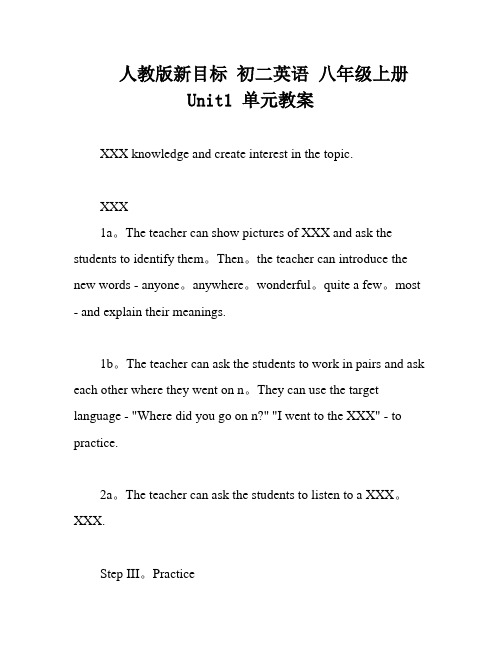
人教版新目标初二英语八年级上册Unit1 单元教案XXX knowledge and create interest in the topic.XXX1a。
The teacher can show pictures of XXX and ask the students to identify them。
Then。
the teacher can introduce the new words - anyone。
anywhere。
wonderful。
quite a few。
most - and explain their meanings.1b。
The teacher can ask the students to work in pairs and ask each other where they went on n。
They can use the target language - "Where did you go on n?" "I went to the XXX" - to practice.2a。
The teacher can ask the students to listen to a XXX。
XXX.Step III。
PracticeXXX can ask the students to work in groups and share their own n experiences using the target language and new words they have learned。
The teacher can also encourage them to ask follow-up XXX.Step IV。
nXXX can ask the students to write a short paragraph about their favorite n using the target language and new words。
人教版初中英语八年级上册Unit1Wheredidyougoonvacation课件
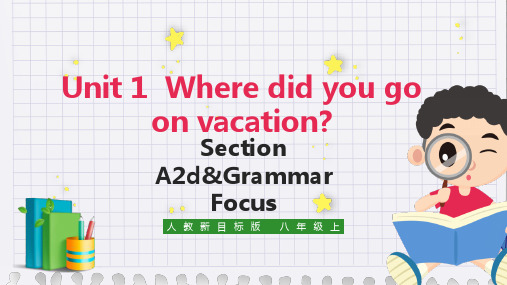
No, I bought nothing.
How was the food?
Everything tasted really good!
Did everyone have a good time?
Oh, yes. Everything was excellent.
语法重点 :1.复习巩固一般过去时
watch → watched
2. 以e 结尾的动词, 只加d
例: live → lived
close → closed
3. 以辅音字母加y结尾的动词,
改y为i, 再加ed
例: study → studied
carry → carried
4. 末尾只有一个辅音字母的重读闭音节词,
先双写这个辅音字母,再加-ed
例: stop → stopped
e.g. 一些学生发现书架上没有几本书。
A few students find few books in the shelf.
没有时间来完成这一点工作。
Little time is left to finish a little work.
人教版英语八年级上册辅导班国庆节unit1
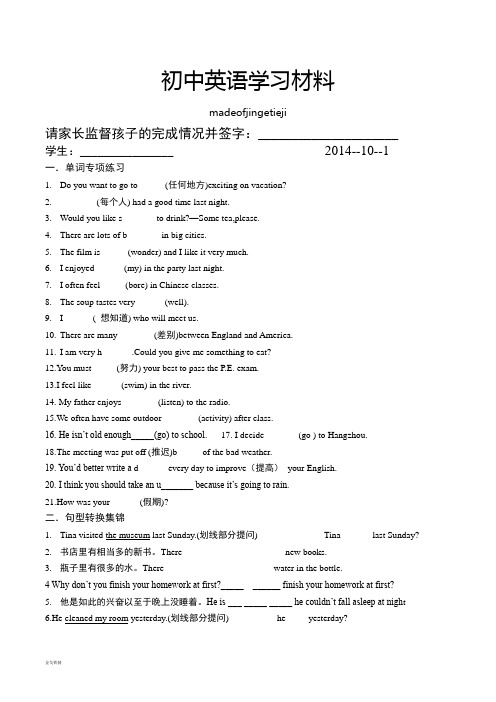
初中英语学习材料madeofjingetieji请家长监督孩子的完成情况并签字:_____________________学生:________________ 2014--10--1 一.单词专项练习1.Do you want to go to______(任何地方)exciting on vacation?2.________(每个人) had a good time last night.3.Would you like s_______ to drink?—Some tea,please.4.There are lots of b_______ in big cities.5.The film is______(wonder) and I like it very much.6.I enjoyed______ (my) in the party last night.7.I often feel_____ (bore) in Chinese classes.8.The soup tastes very______ (well).9.I ______( 想知道) who will meet us.10.There are many _______ (差别)between England and America.11.I am very h______ .Could you give me something to eat?12.You must _____(努力) your best to pass the P.E. exam.13.I feel like ______(swim) in the river.14. My father enjoys _______ (listen) to the radio.15.We often have some outdoor _______ (activity) after class.16. He isn’t old enough_____(go) to school.17. I decide _______(go ) to Hangzhou.18.The meeting was put off (推迟)b_____ of the bad weather.19. You’d better write a d______ every day to improve(提高)your English.20. I think you should take an u_______ because it’s going to rain.21.How was your ______(假期)?二.句型转换集锦1.Tina visited the museum last Sunday.(划线部分提问)______ ______ Tina ______ last Sunday?2.书店里有相当多的新书。
人教版英语八年级上册Unit1 讲义
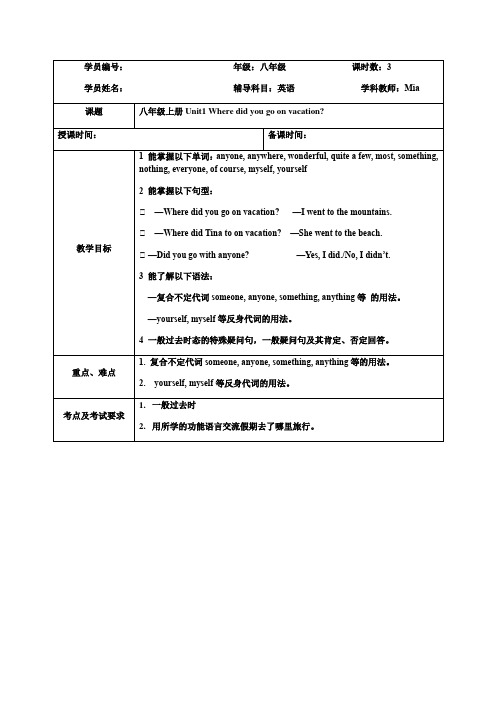
为什么不试着骑车去学校呢?Why not try riding a bike to school?
我要尽我最大努力来帮助你。I will try my best to help you.
试了几次后,他们决定放弃。After a few tries they decided to give up.
4visit v.探望,看望,参观,游览。
常见用法:
1)visit sb.看望某人,探望某人。
e.g. I want to visit my old friends in the US.
e.g. Last week, I visited my grandparents.
bird [bɜːd] n.鸟;禽
bicycle ['baɪsɪkl] n.自行车
building ['bɪldɪŋ] n.建筑物
trader ['treɪdə(r)] n.商人;商船
wonder ['wʌndə(r)] v.惊奇;想知道;怀疑
difference ['dɪfrəns] n.差异;不同
little表示否定意思,没有,几乎没有.
a little表示肯定意思,有一点儿.例如:
There is little ink in my bottle. Can you give me a little ink?
我的瓶子里没有墨水了,你能给我点儿墨水吗?
【牛刀小试】
—Is your friend Michael still in Australia?
3能了解以下语法:
人教版新目标英语八年级上册各单元知识点复习unit1unit101

Unit 1 Where did you go on vacation一、重点短语:1.go on vacation2.quite a few3.stay at home4. take photos5.most of the time6.go shopping7.in the countryside8.keep a diary9.havea good time = have fun = enjoy oneself10.arrive in/at = get to = reach 11.feel like 12.in the past 13.because of 14.find out 15.of course 16. visit museums 17. go to summer camp18. go to the beach 19. anywhere interesting 20. go out with sb 21. seem to be 22. decide to do sth 23. enough money 24. the top of the mountain25.something special 26.so...that 27.study for tests 28.wait for二、重点句型:1. ---Where did you go on vacation ---I went to New York City.2. ---Did you buy anything special ---Yes, I bought something for my father.3. ---How was the food ---Everything tasted really good!4. Still no one seemed to be bored.5. And because of the bad weather, we couldn't see anything below.三、语法1. 不定代词2. 一般过去时四、重要考点:1. 复合不定代词的用法:1)something,anything,nothing,everything是指物的不定代词。
人教版八年级上册英语第一单元unit1复习课件教学资料

Revision
到达
arrive in/at;get to;reach
决定做某事 decide to do
做决定
make a decision
尽力做某事
try to do
尝试做某事
try doing
在过去
in the past
喜欢做某事 四处走走
enjoy doing walk around
wwoorrrrieiedd
不规则动词过去式的变化
1.A-A-A型(无变化的动词) cut-cut-cut let-let-let hit-hit-hit put-put-put cost-cost-cost 2.A-A-B型(现在式和过去式同形) beat-beat-beaten 3.A-B-A型(现在式和过去分词同形) come-came-come become-became-become run-ran-run
Something is wrong with my watch.
Everyone wants to win.
Nobody knows the boy’s name.
There is something for everyone at Green Park.
中考演练
( B)May I have a talk with you ,sir? (2017陕 西21题)
( ) There is ______ junk food here , and it is _____ terrible. A. too much, too much B.much too , much too C. too much ,much too D. much too, much too
人教版英语八年级上册国庆节作业(Units1-2重点词组句子检测)
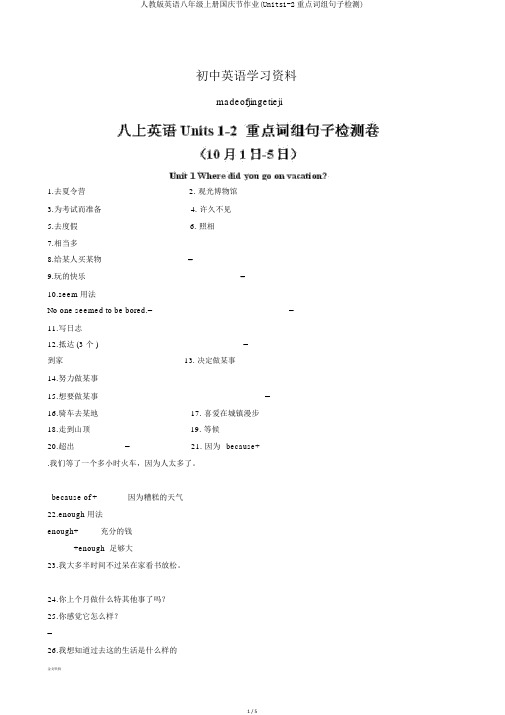
初中英语学习资料madeofjingetieji1.去夏令营 _______________________2. 观光博物馆 _____________________3.为考试而准备___________________4. 许久不见 _______________________5.去度假 _________________________6. 照相__________________________7.相当多 _________________________8.给某人买某物__________________=_______________________________9.玩的快乐 _______________________________ =___________________10.seem 用法 _____________________________________________________No one seemed to be bored.=_______________________________=_______________________________11.写日志 ________________________12.抵达 (3 个 )_________________________________=___________________到家___________________________13. 决定做某事 __________________14.努力做某事 ___________________15.想要做某事 _____________________________________=______________16.骑车去某地___________________17. 喜爱在城镇漫步________________18.走到山顶_____________________19. 等候________________________20.超出 ___________=______________21. 因为because+_________________.我们等了一个多小时火车,因为人太多了。
新人教版初中英语八年级上册全册教案 Unit1-Unit10 1
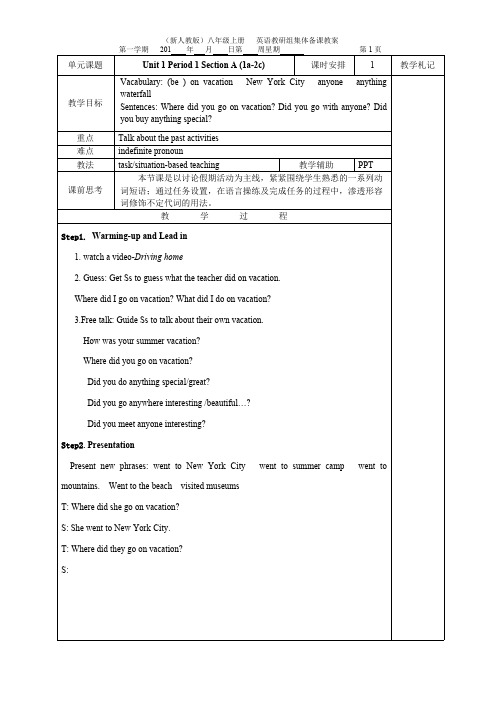
教学目标Vacabulary: (be ) on vacation New York City anyone anything waterfallSentences: Where did you go on vacation? Did you go with anyone? Did you buy anything special?重点Talk about the past activities难点indefinite pronoun教法task/situation-based teaching教学辅助PPT课前思考本节课是以讨论假期活动为主线,紧紧围绕学生熟悉的一系列动词短语;通过任务设置,在语言操练及完成任务的过程中,渗透形容词修饰不定代词的用法。
教学过程Step1. Warming-up and Lead in1. watch a video-Driving home2. Guess: Get Ss to guess what the teacher did on vacation.Where did I go on vacation? What did I do on vacation?3.Free talk: Guide Ss to talk about their own vacation.How was your summer vacation?Where did you go on vacation?Did you do anything special/great?Did you go anywhere interesting /beautiful…?Did you meet anyone interesting?Step2. PresentationPresent new phrases: went to New York City went to summer camp went to mountains. Went to the beach visited museumsT: Where did she go on vacation?S: She went to New York City.T: Where did they go on vacation?S:教学目标Vacabulary: (be ) on vacation New York City anyone anything waterfallSentences: Where did you go on vacation? Did you go with anyone? Did you buy anything special?重点Talk about the past activities难点indefinite pronoun教法task/situation-based teaching教学辅助PPT课前思考本节课是以讨论假期活动为主线,紧紧围绕学生熟悉的一系列动词短语;通过任务设置,在语言操练及完成任务的过程中,渗透形容词修饰不定代词的用法。
人教版八年级英语上册辅导 Unit 1

Unit 1 Where did you go on vacation?词汇和短语1. anyone someone anybody somebody anything something nobody nothing等不定代词,被形容词修饰,形容词后置。
There is something strange in the sky. 空中有些奇怪的东西。
2. wonderful adj. wonder n. 奇迹 v. 想知道,琢磨The Great Wall is known as the eighth wonder of the world. 长城被誉为世界第八大奇迹。
I am wondering whether / if you could go to see a film with me.3. few 否定意义,修饰可数 little 否定意义,修饰不可数肯定:a few 可数 a little不可数拓展:1) 修饰可数:many,a great/good many,a large number of,scores of dozens of There is a large number of peach trees in the field.My mother bought dozens of gel pens last week.2) 修饰不可数: much,a great/good deal of,a large amount ofThere will be a large amount of rain during this month.3) 修饰可数和不可数:a lot of,lots of,plenty ofI have plenty of time to wait for your answer.There is plenty of Spanish books in this library.4. seem v. 好像,似乎It seems that 从句 It seems that nobody would like to come.seem to be They seem to be very hungry. It seems to be interesting.5. bored adj. 感到厌倦的 boring adj. 令人厌倦的She was bored with this movie.I think that it is an interesting story book.6. activity n. 活动take part in / attend different kinds of activities.7. decide v. 决定 decision n. 决定decide to do sthIt's up to you to decide. 这事由你来决定吧。
(完整版)人教版八年级英语上册-Unit1-教案

(完整版)人教版八年级英语上册-U n i t1-教案-CAL-FENGHAI.-(YICAI)-Company One1Unit 1 Where did you go on vacation教材解读本单元的核心话题是用一般过去时谈论度假等发生在过去的事情。
因此“Where did you go on vacation?”“Did you go to the beachYes,I did / No,I didn’t.”等是教学的重点。
通过对本单元的学习,学生能掌握本单元出现的地点名词,用于询问和回答过去发生的事情的短语和句型。
单元目标一、知识与技能1. 词汇:New York City, Central Park, exam, were, rainy, delicious,expensive, inexpensive, crowded, flew, kite, later, felt, little, corner, discuss, etc.2. 句型: Where did you go on vacation I went to summer camp.Did she go to Central ParkYes, she did.No, she didn’t.3. 语法:一般过去时的特殊疑问句、一般疑问句及肯、否定回答。
4. 能力目标:能用一般过去时熟练谈论假期发生的事。
二、过程与方法灵活运用教材,从所教学生的实际水平和语言能力出发,调整和取舍教学内容,合理安排本单元的课时数,设计好每课时的教学内容。
三、情感、态度与价值观1.通过描述假期发生的事,增进同学间的了解,增进感情。
2.通过图片和视频欣赏优美的风景,培养热爱祖国大好河山的思想感情,提高学生的环保意识。
3.了解自己的能力,培养情操4.培养学生们对英语的兴趣。
教法导航1. 以任务型教学作为课堂教学理念、利用整体语言教学法、情景教学法、交际教学法等。
人教版英语八年级上册教案:Unit1 SectionB(1a-1e)

,根据结果反馈,进行精准教 学。】
点
情景交际法,任务型教学法,听说课的“3P”教学模式 :
呈现(语言输入)
建
操练(1.机械操练 2. 听力训练)
议
运用(语言输出)
教
设置情景意义操练
法
设计听后活动任务,先模仿再迁移
总结,听后设置任务提升学生语言运用能力
教学流程
教 学 评
(详见活动设计) 1.本课时的目标设计清晰可操作,活动的设计紧扣目标要求并与目标达成一致。 2.听中的活动设计遵循语言规律,由易到难逐层递进,充分体现语言输入到语言输出的完整过程。 3.听后的活动设计体现对文本内容的深度挖掘和文本再构,体现了对学生思维品格的训练与培养。
价
附:教学活动设计
步骤
过程
1
1
预备与
激活先
期知识 ( 5 )
措施 (教师活动与学生活动)
1.1
“
? ?”
. ,“ , I .”
1.2’s a a —— . ..
2. .
.
“ ’s .
’s .
.
目的
持续性评价
真实情景式导入话题,与生生活 大部分学生是否能举
经验产生共鸣,既是对旧知识的 手主动谈论话题内容;
2
获取
2
新知识
(3 )
1’s
.
S:
.
“?
.
....?
...”
2. 1a 1b, . 答案:1a:1 2 3 4 5 6
1b: 笑脸, , 苦脸, ,
再次运复习巩固目标句型及相应 大 部 分 学 生 是 否 能 据
人教版八年级上unit1辅导教案设计

Where did you go on vacation辅导教案课称名称Unit1 Where did you go on vacation?教学目标掌握重要单词及用法教学重点重要单词的固定搭配教学难点单词的多种用法课堂教学过程Where did you go on vacation?1.Where did you go on vacation? (p1)on vacation意为“在度假”,结构“on+名词”表示“在某种状态中”。
如:on duty在值日中My family went to Hainan on vacation last year.2.visited my uncle (p1)visit此处用作及物动词,后接人或物做宾语,意为“拜访、看望”,后接表示地点的名词,意为“参观、游览”。
如:I visited my grandmother last week.Do you want to visit Shanghai?【拓展】visit 还可以用作名词,意为“访问,参观,游览”,“on a visit to+地点名词” ,意为“在对….参观/访问/游览”如:This is my first visit to China.We are on a visit to Beijing.Visitor意为“参观者;游客”如:These visitors come from America.3....go with anyone? (P. 2)(1)anyone用作不定代词,意为“有人、任何人”,相当于anybody,用于疑问句和否定句中,在肯定句中用someone或者somebody。
但是anyone也可以用在肯定句中,表示“任何一个人”。
如:Did you meet anyone friendly in that city?Anyone can be helpful in some way.(2)anyone只能指人,不可以指物,后面不接of短语;any one既可以指人也可以指物,后可接of短语。
最新人教版八年级上册英语unit1知识点及习题

最新⼈教版⼋年级上册英语unit1知识点及习题最新⼈教版⼋年级上册英语unit1知识点及习题⼀、书本重要语法点梳理go on vacation去度假stay at home待在家⾥go to the mountains去爬⼭go to the beach去海滩visit museums 参观博物馆go to summer camp去参观夏令营quite a few相当多study for为……⽽学习go out出去most of the time⼤部分时间taste good尝起来很好吃have a good time玩得⾼兴]of course当然feel like给……的感觉;感受到go shopping去购物in the past在过去walk around四处⾛⾛because of因为one bowl of…⼀碗……the next day第⼆天drink tea喝茶find out找出;查明go on继续take photos照相something important重要的事up and down上上下下出来buy sth. for sb. / buy sb. sth.为某⼈买某物taste + adj. 尝起来……look+adj. 看起来……nothing…but+动词原形除了……之外什么都没有seem+(to be)+ adj. 看起来……arrive in+⼤地点/ arrive at+⼩地点到达某地decide to do sth.决定去做某事try doing sth.尝试做某事try to do sth.尽⼒去做某事forget doing sth.忘记做过某事forget to do sth.忘记做某事enjoy doing sth.喜欢做某事want to do sth.想去做某事start doing sth.开始做某事stop doing sth. 停⽌做某事dislike doing sth. 不喜欢做某事keep doing sth.继续做某事Why not do. sth.?为什么不做……呢?so+adj.+that+从句如此……以⾄于……tell sb. (not) to do sth. 告诉某⼈(不要)做某事1. on vacation 度假vacation意为“假期、假⽇”,相当于holiday,但vacation表⽰长的假期.如:the long vacation 长假the summer vacation 暑假the Christmas vacation 圣诞假期⽽holiday(尤其美国)指“假⽇;休息⽇;休假”.on vacation = on holiday 意为“度假”练习Where did Mr.Liu go on ________ vacation?—He went to Sanya.A./ B.a C.an D.the2. anything interesting ⼀些有趣的东西1)something,anything,nothing,everything是指物的不定代词.somebody,someone,anybody,anyone,nobody,everybody,everyone是指⼈的不定代词.somewhere,anywhere,nowhere,everywhere是指地点的不定代词.2)当形容词修饰something,anything,nothing,everything等不定代词时,放在这些词的后⾯;1 / 73)这些不定代词做主语时,谓语动词⽤第三⼈称单数.如:Is everybody here? ⼤家都到齐了吗?4)something,somebody,someone,somewhere⽤于肯定句及表⽰请求或建议的疑问句中,⽽anything,anybody,anyone,anywhere⽤于否定句及疑问句中.如:Did you do anything interesting? 你做了有趣的事吗?(表疑问)Why don’t you visit someone with me? 你为什么不跟我⼀起去拜访下某个⼈呢?(表建议)练习 1.There is in today’s newspaper. Let’s read a storybook.A. something interestingB. nothing interestingC. interesting somethingD. interesting nothing2.Did you go fishing with yesterday?—Yes,I went with my father.A.someoneB. anyoneC. no oneD. everyone3.Is there ________ in the room?—________.There is only one old desk.A.anything special;Yes B.anything special;NoC.special anything;Yes D.special anything;No4.There is ________ interesting in the movie.I'd like to see it again.x k b 1 . c o m A.anything B.Nothing C.everything D.something3.buy sth. for sb. 或buy sb. sth如:My parents often buy some books for me. = My parents often buy me some books. 我⽗母经常给我买书.4.提建议的句⼦:①What/ how about +doing sth.? 如:What/ How about going shopping?②Why don’t you + do sth.? 如:Why don’t you go shopping?③Why not + do sth. ? 如:Why not go shopping?④Let’s + do sth. 如:Let’s go shopping⑤Shall we/ I + do sth.? 如:Shall we/ I go shopping?5.long time no see 好久不见6.quite a few 相当多a few 与a little 的区别,few 与little 的区别⑴ a few ⼀些修饰可数名词a little ⼀些修饰不可数名词两者都表肯定意义如:He has a few friends. 他有⼀些朋友.There is a little sugar in the bottle. 在瓶⼦⾥有⼀些糖.⑵ few 少数的修饰可数名词little 少数的修饰不可数名词但两者都表否定意义如:He has few friends. 他没有⼏个朋友.There is little sugar in the bottle.在瓶⼦⾥没有多少糖.练习1.I have quite friends. I feel very happy.A. fewB. a fewC. littleD. a little7.most of … …的⼤多数如:most of the time ⼤多数时间练习1.Basketball is popular with boys.________ of them like playing it. A.Most B.Few C.Much D.Little2 / 78.Still no one seemed to be bored. 仍然没有⼈感到烦闷.1)seem意为“好像;似乎;看来”,是个连系动词,构成的短语有:seem to do sth. 好像做某事如:They seem to talk in class. 他们似乎上课说话. seem(to be)+adj. 似乎...... 如:He seemed ( to be) ill yesterday. 昨天他似乎病了.It seems that + 从句似乎...... 如:It seems that he was ill yesterday. 昨天他似乎病了.练习1.—Frank,it ________ that you like to work with animals.—Yes,I like animals very much.A.looks B.seems C.sounds D.tastes2)bored 作形容词,意为“烦闷的;厌倦的”其主语是某⼈;⽽boring 也是形容词,其主语是某物. 如:①My parents ask me to do homework all day. I feel bored.我⽗母整天叫我做作业,我感到很厌倦.②Doing homework all day is a little boring. 整天做作业有点⽆聊.相类似的词语还有:interested adj. 感兴趣的interesting adj. 有趣的surprised adj. 感到惊奇的surprising adj. 惊奇的tired 累的tiring 令⼈疲惫的excited 兴奋的exciting 令⼈兴奋/激动的amazed 惊讶的amazing 令⼈惊讶的练习1.The book is .I feel .A. boring ,boringB. bored ,boringC. boring,boredD. bored ,bored9. 辨析:get to/reach/arrive牢记:相同点:都是“到达“的意思不同点:get to+地点/reach+地点arrive at+⼩地点(车站等)/arrive in+⼤地点(国家等)注意:若他们后⾯要加地点副词here,there,home等,则不需要加介词.练习1.The Smiths_____ New York at 8:00 last night.A.arrived atB. got toC.reachD.arrived10. enjoy doing sth . 喜欢做…乐意做…如:She enjoys playing football. 她喜欢踢⾜球.enjoy oneself 过得愉快如:He enjoyed himself. 他过得很愉快.跟它意思相近的词组还有have a good \ great time ,have fun.练习1.Do you enjoy ________ photos?A. to takeB.takeC.takingD.takes11. decide 意为“决定”,是动词.它的名词形式为decision.构成的短语有:decide to do sth.decide on doing sth. 决定做某事make a decision to do sth.决定不要做某事,要⽤decide not to do sth..如:Li Lei has decided to go to Beijing . 李雷已经决定去北京.练习1.My parents decide ________ to the beach this week.3 / 7A. goB. goesC. to goD. going2.Mike decided ________ the museum this Sunday.A.visit B.Visits C.visiting D.to visit12.nothing...but...意为“除......之外;只有”,如:I have nothing to do but watch TV all day long. 我整天除了看电视什么也没⼲.13 . feel like 意为:“有什么感觉;感受到”,后跟宾语从句.另外,构成短语feel like doing sth.意为“想做某事”.如:I felt like I was a bird. 我感觉我是⼀只鸟.I feel like eating.我想吃东西.14. because of ,because:because of + 名词/代词/名词性短语如:I had to move because of my job.因为⼯作的原因我得搬家.because +从句如:I do it because I like it. 我做这件事是因为我喜欢.练习1.We have to stay at home ________ the heavy rain.A. becauseB. because ofC. butD. and/doc/7805d1eb302b3169a45177232f60ddccdb38e6d9.html st Sunday we didn't go out ________ the rain.A.because of B.becauseC.in front of D.before15.below意为“在......下⾯”,其反义词为above,意为“在......上⾯”练习1.—The weather was really cold yesterday.—Yes.It was five ________ zero last night.A.under B.belowC.down D.between16. bring sth.to +地点,意为“带来”,其反义词是take.如:Please bring your book to our school. 请把你的书带到我们学校来.Please take your book to your school. 请把你的书带到你的学校去.17.enough ⾜够形容词+enough 如:beautiful enough⾜够漂亮enough+名词如:enough food ⾜够⾷物enough to ⾜够…去做…如:I have enough money to go to Beijing. 我有⾜够的钱去北京.She is old enough to go to school. 她够⼤去读书了.18. so … that如此…以致于引导结果状语从句,so后⾯接形容词、副词. that 后⾯跟从句.如:She was so sad that s he couldn’t say a word. 她悲伤得⼀句话也说不出来.19. taste good 尝起来很好吃.taste系动词⽤法“尝起来”后+形容词.其他表⽰状态的系动词有:feel(觉得)keep(保持)stay(保持)seem(好像)look(看来像……)smell(闻起来)sound(听起来……)taste(尝起来……)系动词与形容词连⽤I feel sick. 我感到难受. Keep quiet,please!请安静下来!The weather stays very hot.天⽓⾮常热. He seems very clever. 他好像很聪明.Jim looks like his father. 吉姆长得像他⽗亲.The fish smells terrible. 这鱼闻起来坏了.That sounds a good idea. 那听起来是个好主意. The soup tastes very delicious.这汤尝起来⾮常⾹.语法4 / 7⼀复合不定代词1、由some,any,no,every加上one,body,thing构成不定代词,成为复合不定代词.2、⽤法(1)复合不定代词相当于名词,在句中可以⽤作主语、宾语和表语. Someone is knocking at the door.I don’t have anything to say today.Money isn’t everything.(2)复合不定代词被形容词、动词不定式修饰时,形容词和动词不定式后置.I have something important to tell you.There is nothing wrong with the radio.(3)复合不定代词做主语时,表⽰单数概念,谓语动词⽤单词形式. Everything begins to grow in spring.(4)some-不定代词⽤在肯定句中或者表⽰请求的⼀般疑问句中;any-不定代词多⽤于疑问句中否定句中.Will you ask someone to carry the box for me?Would you like something to drink?(5)anyone和anything也可以⽤在肯定句中,表⽰“任何⼈”和“任何事”. Anyone can do it.I can do anything for you.①. I can’t hear anything = I can hear _________.②. There is __________ on the floor. Please p ick it up.③. No one ________ how to do it. A. know B. knows C. knowing D. knew④. There’s ________in the newspaper. You should read it.A. important somethingB. something boringC. boringsomethingD. somethingimportant.⼆⼀般过去时的规则动词和不规则动词(⼀)规则变化构成规则:在动词末尾直接加-ed . 例如,work -worked ,look -looked ,play –played 以不发⾳的字母e结尾的动词,直接加-d . 例如,live –lived ,hope –hoped ,use –used以辅⾳字母+y结尾的,变y为i再加-ed . 例如,study –studied ,carry –carried ,worry –worried以重读闭⾳节结尾且末尾只有⼀个辅⾳字母的,双写最后的辅⾳字母,再加-ed .例如,stop –stopped ,plan–planned(⼆)不规则变化1. 没有变化,即:与动词原形⼀样.例如,cut –cut ,put –put ,read –read2. 变化元⾳,例如,write- wrote ,know ––came3. 变化辅⾳,例如,make –made ,spend –spent ,send –sent4. 辅⾳和元⾳都变化,例如,leave –left ,teach –taught ,think –thought5. 其他情况,例如,is –was ,are –were ,have –had练习1.I _____________( have ) a good time with my family in that city last year.2. ___________Helen often ______________(go )shopping on Sundays ?5 / 73. Tony ____________( not finish ) his homework on time yesterday .4. ___________your parents _______( buy ) you a gift for your last birthday ?5. my father often ____________( ride ) his bike to work .6.—Where ________ you ________ lunch?—At home. There was no school lunch.B. are,havingC. will,haveD. do ,have巩固练习单项选择1.Did you do _______ on your vacation, Alice?A.anything funB.fun anythingC.something funD.fun something2.Did you go _____?A.interesting somewhereB.somewhere interestingC.anywhere interestingD.interesting anywhere3.I went to summer ______.A.vacationsB.dayC.vacationD.camp4.Where did you go _____ vacation?A.toB.onC.forD.in5.And _______ the bad weather, we couldn’t see anything below.A.andB.becauseC.butD.because of6._______ kind girl Jenny is!A.WhatB. What aC. HowD. How a7.Did you study ______your test?A.onB.atC.forD.in8.—I didn’t bring back anything from Malaysia.—_______ at all?A.SomethingB.AnythingC.NothingD.Everything9.She isn’t ________to carry the box.A.enough strongB.strong enoughC.enough youngD.Young enough10.---Oh, dear, we have____food left.---don’t worry. I’ll go and buy some.A.a fewB.a littleC.fewD.little11.—________ did you go last weekend?—I went to the mountains with my classmates.A.How B.When C.Where D.Who12.Yesterday the boys ________ to the park and ________ a good time there. A.go;have B.went;haveC.go;had D.went;had13.—Did you like your vacation?—________.It was great.A.Yes,I was B.No,I wasn'tC.Yes,I did D.No,I didn't14.—How was your vacation,Grace?—________.I had a wonderful time.A.It is bad B.It was greatC.It was bad D.It is great15.—I couldn't do anything but study for the tests during the vacation.—________.Your parents are too strict(严格的) with youA.Sounds terrible B.No problemC.For sure D.Good idea16.How was your vacation?—______ . I liked it very much.A. Very badB. WonderfulC. I’m fineD. Have a good time17.—What would you like?—We'd like two ________ and some beef soup.A.bowls of rices B.bowl of riceC.bowls of rice D.bowl of rices18.I ate a big bowl of noodles five minutes ago.Now I'm not ________.6 / 7A.tried B.hungryC.cold D.busy19.—May I use your dictionary,Cindy?—________,here you are.A.Sorry B.Great C.Thanks D.Of course20.—Did you learn English by ________?—No.Mr.Smith taught me.A.you B.yours C.yourself D.yourselves21.—________ did you go to the beach with?—Tom and Jack.A.Where B.When C.Who D.How22.I ________ the new museum ________ my classmate last weekend. A.visit;with B.visited;for C.visit;for D.visited;with⼆、句型转换.1.I went to New York City. (对划线部分提问)_______ did you _______ on vacation?2.I bought something special for my father. (改为⼀般疑问句)________ you buy ________ special for your father?3.I don’t like the man. (改为同义句)I _______ the man.4.Everyone had a great time. (改为同义句)Everyone _______ _______.5.The Malaysia yellow noodles were delicious. (对划线部分提问)________ _______ the Malaysia yellow noodles?四、根据句意及⾸字母或汉语提⽰完成单词.1.We didn’t have an u__________ so we were wet and cold.2.The food tasted great because I was so h_________!3.E__________ was on vacation.4.It was ____________(精彩的).5.I just stayed at home ________(⼤多数) of the time to read and relax.6.My father didn’t bring _________(⾜够的) money.7.I _______(想知道) what life was like here in the past.8.We w________ over an hour for the train because there were too many people.9.Why didn’t you buy anything for _________(你⾃⼰)?10.What ________(活动) do you find enjoyable?五、翻译下列句⼦.1.昨天你吃什么⾷物了?_______ ________ _______ you _______ yesterday?2.你觉得这次旅⾏怎么样?How did you _______ _______ the trip?3.似乎没有⼈感到⽆聊.No one _______ _______ _________.4.我感觉我是⼀只鸟.I ________ ________ I was a bird.5.我们想要⾛到⼭顶,天却开始下⾬了.We wanted to ______ _______ ________ ________,but then it started raining a little.7 / 7。
- 1、下载文档前请自行甄别文档内容的完整性,平台不提供额外的编辑、内容补充、找答案等附加服务。
- 2、"仅部分预览"的文档,不可在线预览部分如存在完整性等问题,可反馈申请退款(可完整预览的文档不适用该条件!)。
- 3、如文档侵犯您的权益,请联系客服反馈,我们会尽快为您处理(人工客服工作时间:9:00-18:30)。
请家长监督孩子的完成情况并签字:_____________________学生:________________ 2014--10--1 一.单词专项练习1.Do you want to go to______(任何地方)exciting on vacation?2.________(每个人) had a good time last night.3.Would you like s_______ to drink?—Some tea,please.4.There are lots of b_______ in big cities.5.The film is______(wonder) and I like it very much.6.I enjoyed______ (my) in the party last night.7.I often feel_____ (bore) in Chinese classes.8.The soup tastes very______ (well).9.I ______( 想知道) who will meet us.10.There are many _______ (差别)between England and America.11.I am very h______ .Could you give me something to eat?12.You must _____(努力) your best to pass the P.E. exam.13.I feel like ______(swim) in the river.14. My father enjoys _______ (listen) to the radio.15.We often have some outdoor _______ (activity) after class.16. He isn’t old enough_____(go) to school.17. I decide _______(go ) to Hangzhou.18.The meeting was put off (推迟)b_____ of the bad weather.19. You’d better write a d______ every day to improve(提高)your English.20. I think you should take an u_______ because it’s going to rain.21.How was your ______(假期)?二.句型转换集锦1.Tina visited the museum last Sunday.(划线部分提问)______ ______ Tina ______ last Sunday?2.书店里有相当多的新书。
There _____ _____ _____ _____ new books.3.瓶子里有很多的水。
There _____ ______ ______ _____water in the bottle.4 Why don’t you finish your homework at first?_____ ______ finish your homework at first?5.他是如此的兴奋以至于晚上没睡着。
He is ___ _____ _____ h e couldn’t fall asleep at night6.He cleaned my room yesterday.(划线部分提问)_____ ___ he ____ yesterday?7.She did her homework last night.(改为否定)She ______ _____ her homework last night.8.My vacation was great.(划线部分提问)_____ _____ your vacation?9.很长时间没见面了。
_____ ______ _____ _____.10.你和别人出去了吗?_____ you _____ out with _____?11.你遇见有趣的人了吗?Did you meet_____ _______?12.你买了特别的东西了吗?Did you buy ______ ______?13.我感觉自己像只鸟。
I _____ ______ that I was a bird.14.没什么可做的。
There is _______ _______ _______.三.用所给单词的适当形式填空1.—Did you buy anything for______(you)?---No, I didn’t.2.There was nothing ______(do) there but watch TV.3.The little boy seems _______(know) everything.4.Maria wrote a lot of ________(diary).5.Listen!________(anyone) is singing in the room.6. I_______ (call) my mother this morning.7. She watches TV every evening . But she___________(not watch) TV last night.8.It was sunny last Sunday. I _________(go) to the beach with my parents.9. ---When_______ your brother______(do) his homework?----He ________(do) it an hour ago.10.---Why _______(be) the boy late for school this morning?----Because he _______(have) breakfast late.四.从方框中选择合适的单词填空。
something, anything, everything, nothing1.This is my first time to Beijing, so _____ is interesting for me.2.Would you like ________ to eat?3.—Do you have______ to say for yourself? ---- No, I have ______to say.someone, anyone, everyone, no one.4.It’s a secret .________ knows about it.5.Can you ask _______ to help me ,please?6.There isn’t _______ watching TV now.7.The teacher al ways says “______ in our class must study hard.”五.句型转换1.Jack went to France on vacation .(对划线部分提问) ______ _____ Jack____ on vacation?2.I bought nothing.(改为同义句)。
I ___________________________.3.Betty studied for tests last Friday.(改为一般疑问句)。
____Betty_____for tests last Friday?4.They played basketball yesterday.(对划线部分提问) ____ ______ they ______ yesterday?5. Jane bought something special.(改为否定句) Jane______ ______ _______ _______.6.Alice did her homework at home yesterday.(改为否定句)。
Alice ______ ______ her homework at home yesterday.7.There was some tea in the cup.(变为一般疑问句)。
______ there_______tea in the cup?8. They went to the beach on vacation.(对划线部分提问)______ ______ they ______ on vacation?9. She stayed there for a month.(对划线部分提问)_______ ________ _______ she _______ there?10.He didn’t come because he went on vacation.(对划线部分提问)______ ________ he _________?11.Miss Smith writes a letter to her boyfriend in her bedroom.(用yesterday evening 改写)。
Miss Smith _______ _______ _______ to her boyfriend in her room yesterday evening.12.Where ______he _______(play) volleyball last Sunday?13.They stopped here because they__________(not know) the way to the station.14.---Why didn’t you come to the party? Because I_________ (not know) you were in Shanghai.15.My sister came into the room,_______(turn) on the light , and _______(watch) TV.六.主要语法(一).Seem用法:1、“主语+ seem +(to be )+表语”,表语多为名词或形容词。
Tom seems _________________. 汤姆看上去是一个非常聪明的男孩。
The man over there ________________. 那边的那个人看上去像一个新老师。
